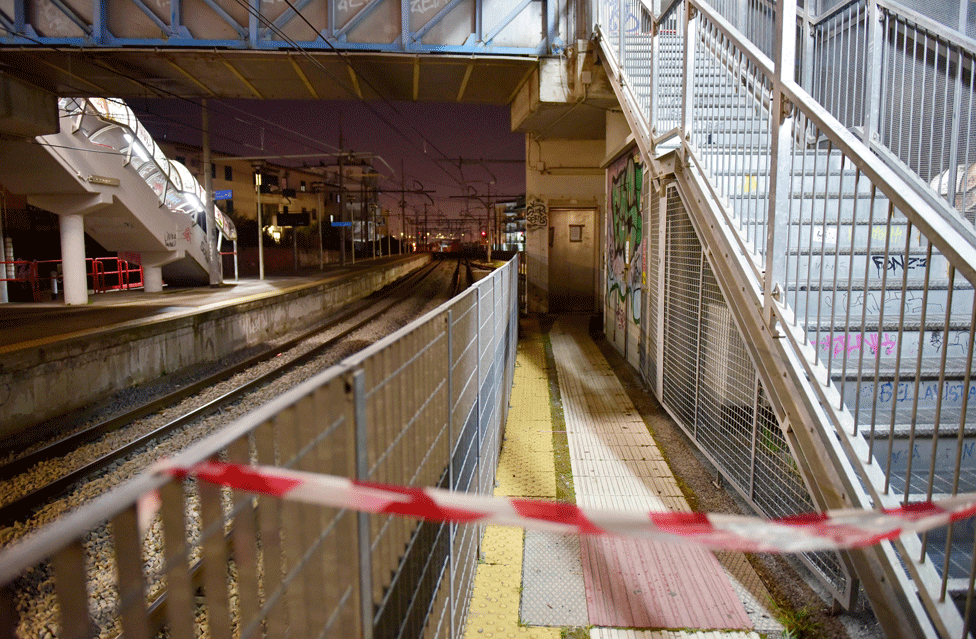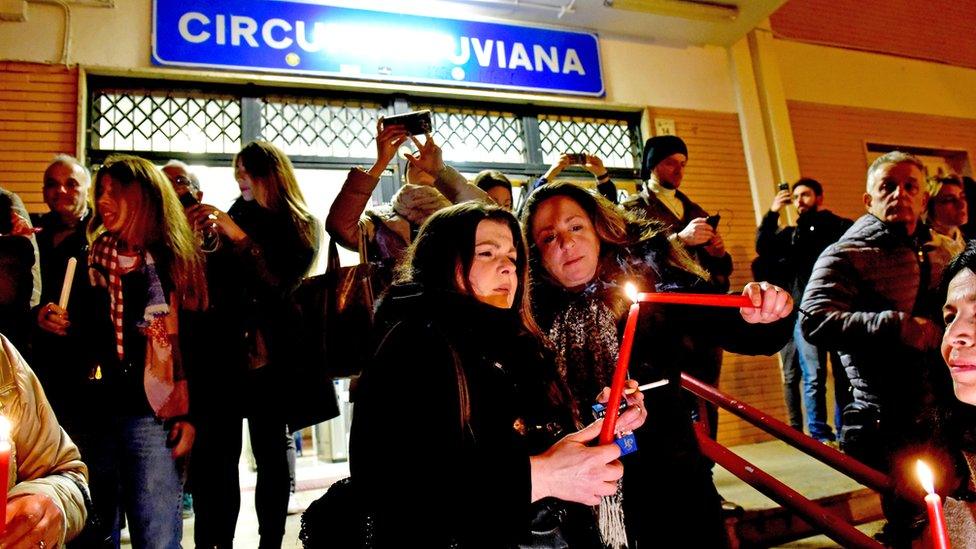'I'm full of fear': Italian woman's story exposes rape law
- Published

The alleged rape took place in the station lift at San Giorgio a Cremano
It was early evening on 5 March when a 24-year-old woman ran into three men at a train station in Naples.
The three men, whom she knew slightly, got into a lift with her. What happened during the next 12 minutes is now the subject of intense dispute.
The men say they had consensual sex with the woman, but she says they raped her. A court is investigating.
'I'm scared and hurt'
A colleague and I arranged to meet the young woman in a square in Rome.
We did not know how we might recognise her. We came across a young, shockingly thin woman. She offered a timid handshake.
Her lawyer, standing next to her, said that she was ready to talk and I asked several questions:
Why have you decided to speak out?
"Speaking out is the only way to express my pain. Communicating is the best way of obtaining justice."
You refer to your pain. How are you?
"I'm a bit hurt. I'm full of fears. I'm scared and hurt."She fiddled with her handbag and tried to find a packet of tissues.
When you reported what happened to you, what was the process like?
"Initially they believed me - the lawyers, and the psychologists at the Naples hospital. The violence was also obvious in the medical test. Also the policemen believed and the prosecutors' office. But the appeals court has decided to free two of these guys."
Is that something that concerns you?
"It's not that it concerns me. It terrifies me. They know the place where I live, because on a previous occasion they had followed me to my house. I'm scared, I think they may want a vendetta."
What court says about Naples case
A court has ordered the release of all three defendants pending a full trial. The BBC obtained a copy of the tribunal's 24-page ruling.
The document goes into great detail about the woman's medical history of eating disorders, depression, and alleged abuse at the hands of her father.

A candle-lit vigil was held the night after the woman was allegedly attacked
The court says: "The combination of the victim's conditions leads us to judge that she is untrustworthy - and hence her version of events cannot be relied upon - on its own."
It adds that she has a "histrionic personality". But her defenders argue that her medical history cannot be used to say that she makes things up.
The tribunal also says that CCTV footage of the alleged attack, which has not been played in public, shows that she neither resisted nor showed any visual signs of trauma after the encounter with the three men.
In Italy, the argument "she didn't resist, she didn't stagger afterwards, therefore she wanted it" is often extremely powerful.
But one Italian judge is disgusted by this logic.
"If a woman doesn't rebel, it means the woman wants it," says Judge Paola di Nicola, who has written a book on gender bias in the Italian judicial system. "This is unacceptable. It often finishes with the acquittal of the men."
Through questions they ask victims and defendants in male or sexual violence cases, (lawyers and judges) risk repeating stereotypes… that contain moral and value judgements
TV programmes and newspapers have covered this case at length. "She was promiscuous and she had a tendency to lie," writes one publication.
Public opinion has begun to doubt the woman's story.
It is hard not to contrast this with recent events in Spain. In 2018, women's movements demonstrated after a court imposed lenient sentences on a group of men accused of raping a woman - the so-called "wolf-pack" case.
Activists say rage over Spain's "wolf pack" case has ignited a feminist revolution
In Italy, as in Spain, there is currently no clear definition of consent when it comes to rape cases. Use of force, threat or abuse of authority has to be proven for a case to be considered sexual violence under Italian law.
Acid attack survivor who turned to politics
It may be that, in Italy, it is much easier for a victim to be believed when the physical results of an assault are visible and beyond dispute.
In 2013, Lucia Annibali's former partner organised an acid attack against her. Her face was severely disfigured.
He is now in prison. She won election to parliament in 2018.

Lucia Annibali entered the Italian parliament in 2018, five years after the acid attack
Were you lucky to survive? I asked her.
"Yes, definitely," she said. "Seeing how it could have gone. In part, I died a bit. An acid attack takes away a part of you. Your face, your looks are gone. So part of me died on the landing where the attack happened."
Does the law need to change or the culture?
"Both," she replied, "A proper culture can help build the law. The instruments are there and what we're lacking is proper use of those instruments."
We can get angry as much as we want as a society, but until women are considered equal, it will never be enough
Lucia Annibali's disfigurement is clear. But the scars of forced sexual encounters are not always so easy to see.
I asked a final question of the young woman at the heart of the Naples case:
In the future, what do you envisage for your life?
"I'd like to launch an association that protects women at risk."
After this, her lawyer gently approached. He worried that she was too exhausted to speak any further. They left to prepare for the trial.
- Published13 February 2017
